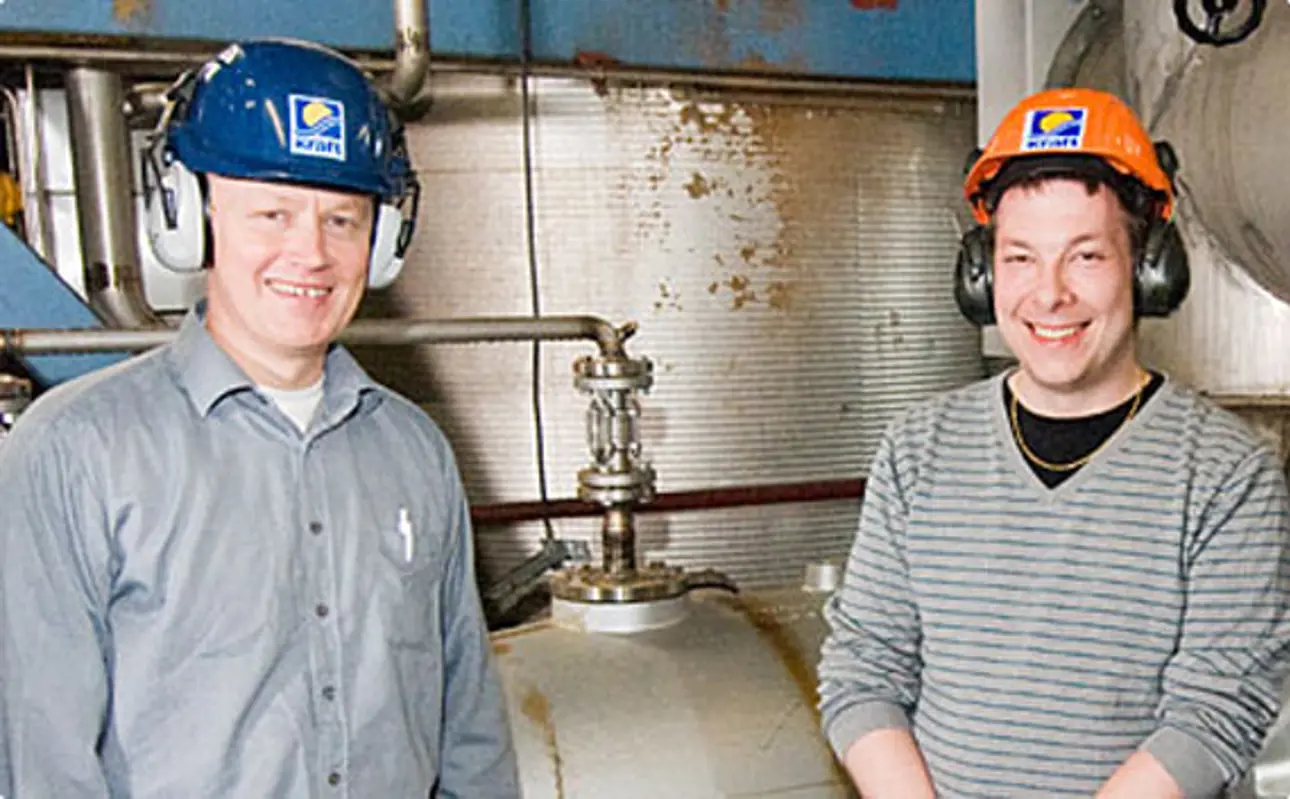High dewatering capacity boosts biopellet plant efficiency
May 2, 2011

Svante Carlsson, Production Manager, Skellefteå Kraft, and
Henrik Palmlöf, Project Leader, Hedensbyn Bioenergikombinat.
“We realized several benefits when we replaced a very old PFA 500 plug screw with a new FeedMax ADI 500 plug screw equipped with a DewateringPlugPipe. The greatest gain was dewatering capacity. Greater capacity has meant greater production efficiency. “With FeedMax, solids content in is now 50%, and out it’s at 40%, and that contributes a lot to our strong belief that bioenergy will play an important role in Swedish energy production,” says Henrik Palmlöf, Project Leader, Hedensbyn Bioenergikombinat. Before FeedMax, raw materials entered the plug screw at 50% dry solids content and exited at the same value. The Hedensbyn Bioenergikombinat is a subsidiary of Skellefteå Kraft, a wholly-owned municipal jointstock company and one of the largest energy companies in Sweden.
Sustainable energy and biopellet resources
The raw materials used at Skellefteå Kraft in general and at Hedensbyn in particular are of the highest quality. They are sourced from by-products of the logging, sawmilling and woodworking industries. Making use of local energy resources helps to ensure a sustainable energy supply that is part of the natural energy cycle. The main operation at Hedensbyn is a combined heating and power plant. In this operation, steam is produced in the boiler at high pressure and temperature, and then led to a turbine, which drives an electricity-producing generator. Most of the steam is then led away from the high-pressure turbine to a heat condenser, where it warms the water used for district heating.
Mechanical drying reduces steam drying
The steam not used for district heating is transported over to the pellet factory at Hedensby, where it is used to dry the raw materials for production of biopellets. This process presses the dried raw material into small, cylindrical pellets. The result is a compressed environmentally-friendly biofuel of high energy content that is sold to district heating and institutional facilities as well as to households. The drying process is where the significance, as well as the benefit, of the dewatering capacity of the FeedMax becomes apparent. “Quite simply,” as Palmlöf puts it, “mechanical dewatering before steam-induced heating means using less steam to dry the raw materials from which our pellets are made.”
Increased income from electricity production
"With 40% out of FeedMax instead of the former 50%, we now can divert more steam to the pellet plant’s low-pressure turbine to generate electricity, which we sell to the grid. And we don’t object to adding to our income as a result of selling electricity,” adds Palmlöf with a smile. According to Palmlöf, other benefits accruing to Hedensbyn as a result of installing FeedMax, apart from efficient dewatering, are low maintenance, high availability, increased capacity and the ability to control solids content. “Product stability is also an important factor for us. FeedMax has meant a more uniform product of higher quality, easy operation and excellent control of the process,” says Palmlöf.
FeedMax a technology leader
Since Skellefteå Kraft is a wholly-owned municipal jointstock company, projects must be put out for competitive bidding. Palmlöf established three criteria for deciding on a supplier. One was cost, another was technology, and the third was references.
Depending on the specific process, the FeedMax concept can be customized to fit each function by careful choice of screw type, screw compression, screw pipe and plug pipe. In this specific application, the natural choice was to use the DewateringPlugPipe, which extends the dewatering zone and therefore achieves better dewatering. “This equipment has been in operation for only about six months, so we haven’t really had enough experience of it to calculate a Return On Investment. But I can say now that we are happy with the results we’ve seen so far,” says Palmlöf.